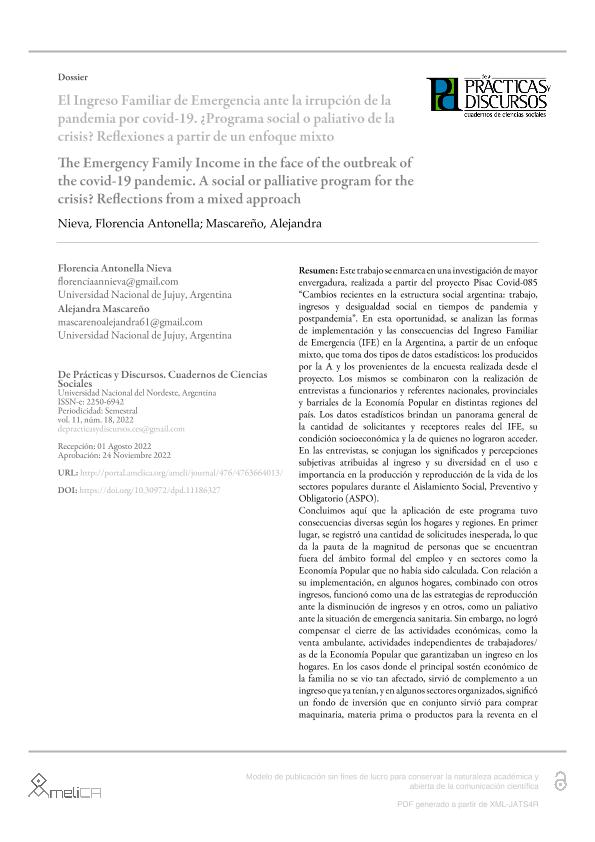Artículo
Este trabajo se enmarca en una investigación de mayor envergadura, realizada a partir del proyecto Pisac Covid-085 “Cambios recientes en la estructura social argentina: trabajo, ingresos y desigualdad social en tiempos de pandemia y postpandemia”. En esta oportunidad, se analizan las formas de implementación y las consecuencias del Ingreso Familiar de Emergencia (IFE) en la Argentina, a partir de un enfoque mixto, que toma dos tipos de datos estadísticos: los producidos por la A y los provenientes de la encuesta realizada desde el proyecto. Los mismos se combinaron con la realización de entrevistas a funcionarios y referentes nacionales, provinciales y barriales de la Economía Popular en distintas regiones del país. Los datos estadísticos brindan un panorama general de la cantidad de solicitantes y receptores reales del IFE, su condición socioeconómica y la de quienes no lograron acceder. En las entrevistas, se conjugan los significados y percepciones subjetivas atribuidas al ingreso y su diversidad en el uso e importancia en la producción y reproducción de la vida de los sectores populares durante el Aislamiento Social, Preventivo y Obligatorio (ASPO). Concluimos aquí que la aplicación de este programa tuvo consecuencias diversas según los hogares y regiones. En primer lugar, se registró una cantidad de solicitudes inesperada, lo que da la pauta de la magnitud de personas que se encuentran fuera del ámbito formal del empleo y en sectores como la Economía Popular que no había sido calculada. Con relación a su implementación, en algunos hogares, combinado con otros ingresos, funcionó como una de las estrategias de reproducción ante la disminución de ingresos y en otros, como un paliativo ante la situación de emergencia sanitaria. Sin embargo, no logró compensar el cierre de las actividades económicas, como la venta ambulante, actividades independientes de trabajadores/as de la Economía Popular que garantizaban un ingreso en los hogares. En los casos donde el principal sostén económico de la familia no se vio tan afectado, sirvió de complemento a un ingreso que ya tenían, y en algunos sectores organizados, significó un fondo de inversión que en conjunto sirvió para comprar maquinaria, materia prima o productos para la reventa en el comercio popular. En fin, última instancia de una circulación comunitaria del bien dinero. This work is part of a larger investigation carried out from the PISAC COVID-085 project "recent changes in the Argentine social structure: work, income and social inequality in times of pandemic and post-pandemic". In this opportunity, the forms of implementation and the consequences of the Emergency Family Income (IFE) in Argentina are analyzed from a mixed approach, which takes two types of statistical data: those produced by the Anses and those from the survey carried out. from the project. ey were combined with interviews with officials and national, provincial and neighborhood leaders of the popular economy in different regions of the country. Statistical data provide an overview of the number of real IFE applicants and recipients, their socioeconomic status, and that of those who did not gain access. In the interviews, the subjective meanings and perceptions attributed to income and its diversity in use and importance in the production and reproduction of the life of the popular sectors during Social, Preventive and Compulsory Isolation (ASPO) are combined. We conclude that the application of this program had diverse consequences according to households and regions. In the first place, an unexpected number of applications was registered, which indicates the magnitude of people who are outside the formal sphere of employment and in sectors such as the popular economy that had not been calculated. In relation to its implementation, in some households, combined with other income, it functioned as one of the reproduction strategies in the face of decreased income and in others as a palliative in the face of the health emergency situation. However, it failed to compensate for the closure of economic activities; such as street vending, independent activities, workers of the popular economy, who guaranteed an income in the homes. In cases where the main breadwinner of the family was not so affected, it served as a complement to an income they already had. In some organized sectors it meant an investment fund that together served to buy machinery, raw materials or products for resale in popular commerce. Ultimately, this meant a communitarian circulation of good money.
El Ingreso Familiar de Emergencia ante la irrupción de la pandemia por covid-19: ¿Programa social o paliativo de la crisis? Reflexiones a partir de un enfoque mixto
Título:
The Emergency Family Income in the face of the outbreak of the covid-19 pandemic: A social or palliative program for the crisis? Reflections from a mixed approach
Fecha de publicación:
12/2022
Editorial:
Universidad Nacional del Nordeste. Centro de Estudio Sociales
Revista:
De prácticas y discursos
e-ISSN:
2250-6942
Idioma:
Español
Tipo de recurso:
Artículo publicado
Clasificación temática:
Resumen
Archivos asociados
Licencia
Identificadores
Colecciones
Articulos(CIITED)
Articulos de CENTRO INTERDISCIPLINARIO DE INVESTIGACIONES EN TECNOLOGIAS Y DESARROLLO SOCIAL PARA EL NOA
Articulos de CENTRO INTERDISCIPLINARIO DE INVESTIGACIONES EN TECNOLOGIAS Y DESARROLLO SOCIAL PARA EL NOA
Citación
Nieva, Florencia Antonella; Mascareño, Alejandra Gabriela; El Ingreso Familiar de Emergencia ante la irrupción de la pandemia por covid-19: ¿Programa social o paliativo de la crisis? Reflexiones a partir de un enfoque mixto; Universidad Nacional del Nordeste. Centro de Estudio Sociales; De prácticas y discursos; 11; 18; 12-2022; 1-15
Compartir




